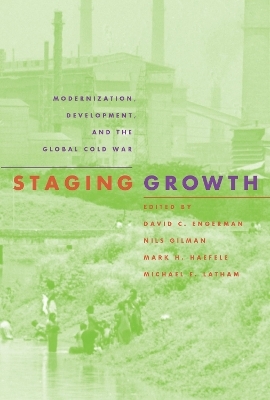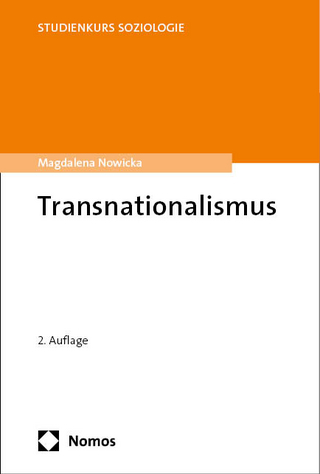
Staging Growth
Modernization, Development and the Global Cold War
Seiten
2003
University of Massachusetts Press (Verlag)
978-1-55849-370-4 (ISBN)
University of Massachusetts Press (Verlag)
978-1-55849-370-4 (ISBN)
Beginning in the 1950s, the theory of modernization emerged as the dominant paradigm of sconomic, social, and political development within the America foreign policy establishment. This collection of essays attempts to shed fresh light on the global forces that shaped the Cold War and its legacies.
A timely reassessment of modernization theory and its international impact; Beginning in the 1950s, the theory of modernization emerged as the dominant paradigm of economic, social, and political develoment within the American foreign policy establishment. Purporting to explain the stages through which all nations pass on the road to industrial modernity, it provided a rationale for a broad range of cultural and political projects aimed at fostering Third World growth while simultaneously combating communism. But modernization theory was more than simply an expression of Cold War ideology. As the essays in this volume show, the ideal of modernization proliferated throughout the postcolonial world and across ideological lines in places as diverse as East Asia, Southern Africa, and South Asia. Indeed, it was embraced by all who shared the American enthusiasm for the increased production and higher standards of living promised by industrialization - enemies and allies alike. Situating modernization theory historically, Staging Growth avoids conventional chronologies and categories of analysis, particularly the traditional focus on conflicts between major powers. The contributors employ a variety of approaches - from economic and intellectual history to cultural criticism and biography - to shed fresh light on the global forces that shaped the Cold War and its legacies. Most of the pieces are comparative, exploring how different countries and cultures have grappled with the implications of modern development. At the same time, all of the essays address similar fundamental questions. Is modernization the same thing as Westernization? Is the idea of modernization universally valid? Do countries follow similar trajectories as they undertake development? Does modernization bring about globalization? In addition to the editors and Akira Iriye, contributors include Michael Adas, Laura Belmonte, Gregg Andrew Brazinsky, Christina Klein, J. Victor Koschmann, and Michael R. Mahoney.
A timely reassessment of modernization theory and its international impact; Beginning in the 1950s, the theory of modernization emerged as the dominant paradigm of economic, social, and political develoment within the American foreign policy establishment. Purporting to explain the stages through which all nations pass on the road to industrial modernity, it provided a rationale for a broad range of cultural and political projects aimed at fostering Third World growth while simultaneously combating communism. But modernization theory was more than simply an expression of Cold War ideology. As the essays in this volume show, the ideal of modernization proliferated throughout the postcolonial world and across ideological lines in places as diverse as East Asia, Southern Africa, and South Asia. Indeed, it was embraced by all who shared the American enthusiasm for the increased production and higher standards of living promised by industrialization - enemies and allies alike. Situating modernization theory historically, Staging Growth avoids conventional chronologies and categories of analysis, particularly the traditional focus on conflicts between major powers. The contributors employ a variety of approaches - from economic and intellectual history to cultural criticism and biography - to shed fresh light on the global forces that shaped the Cold War and its legacies. Most of the pieces are comparative, exploring how different countries and cultures have grappled with the implications of modern development. At the same time, all of the essays address similar fundamental questions. Is modernization the same thing as Westernization? Is the idea of modernization universally valid? Do countries follow similar trajectories as they undertake development? Does modernization bring about globalization? In addition to the editors and Akira Iriye, contributors include Michael Adas, Laura Belmonte, Gregg Andrew Brazinsky, Christina Klein, J. Victor Koschmann, and Michael R. Mahoney.
David C. Engerman is assistant professor of history at Brandeis University. Nils Gilman is a postgraduate fellow at the University of California, Berkeley. Mark H. Haefele is a lecturer at Harvard University. Michael E. Latham is associate professor of history at Fordham University.
| Erscheint lt. Verlag | 30.4.2003 |
|---|---|
| Reihe/Serie | Culture, Politics & the Cold War |
| Vorwort | Akira Iriye |
| Zusatzinfo | 4 illustrations |
| Verlagsort | Massachusetts |
| Sprache | englisch |
| Gewicht | 425 g |
| Themenwelt | Sozialwissenschaften ► Politik / Verwaltung ► Europäische / Internationale Politik |
| Sozialwissenschaften ► Politik / Verwaltung ► Politische Theorie | |
| Sozialwissenschaften ► Politik / Verwaltung ► Staat / Verwaltung | |
| Sozialwissenschaften ► Soziologie ► Spezielle Soziologien | |
| ISBN-10 | 1-55849-370-0 / 1558493700 |
| ISBN-13 | 978-1-55849-370-4 / 9781558493704 |
| Zustand | Neuware |
| Haben Sie eine Frage zum Produkt? |
Mehr entdecken
aus dem Bereich
aus dem Bereich
erfolgreiche Interessenvertretung durch Prozesskompetenz im komplexen …
Buch | Hardcover (2023)
Wiley-VCH (Verlag)
42,00 €


